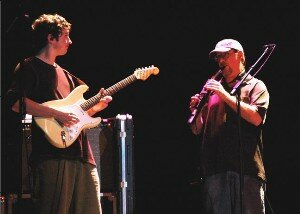CULTURE- BUZZ BOX<span class="Apple-converted-space"> </span>Wind synth: Don't ask, just listen
Clearly, Bruce Hornsby employs Bobby Read for more than his chops. The sax player routinely runs his horn through an electronic harmonizer to turn it into a layer of chordal accompaniment; obviously, he also has a sense of adventure.
His latest project, Monkfish, is a hodgepodge of the usual suspects in local jazz collaborating to give him a backdrop for his electronic wind synth, a device that pretends to be a saxophone but actually generates its sounds using instrument modeling programs running on his laptop.
"I started working with that instrument two years ago, just to get a different range of sounds with the Hornsby band," he says. "As I got more and more into it, I got more and more interested in doing a whole record with it."
Unusual? Sure. But maybe that's the point: "I'm not sure if anybody else has put out a record like this, with wind synth as the main voice," says Read.
He will release the self-titled debut album at Gravity Lounge this week. He's even further ahead of the curve than that, actually– the album was all but finished a year ago, but it languished on the shelf while he fruitlessly pitched it to record labels.
"I sent it out to Verve, but my connection there actually got fired from his job the week we got it to him," he recalls.
Unlucky? Sure. But Read also thinks that any new jazz project faces an uphill battle: "Verve is not signing any new jazz. They're just done with it," he says. He feels that the label whose roster a half century ago read like a jazz hall of fame induction ceremony has now all but lost interest in investing in the longevity of a genre which, by some accounts, makes up only three percent of record sales nationally.
In the end, while taking stock of drummer Brian Caputo's limited swing and ample aggression, Read relents: "There's not that much real jazz on there." But in the context of a musical tradition so inextricably rooted in progressivism becoming domesticated by high art to the point of commercial impotence, maybe that's the point.

Bobby Read
Publicity Photo
#